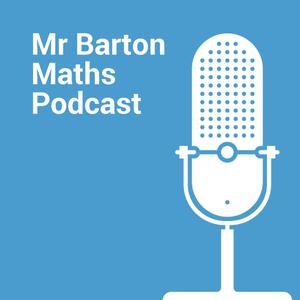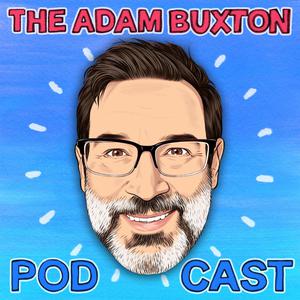
Mr Barton Maths Podcast
Craig Barton
Craig Barton interviews guests from the wonderful world of education about their approaches to teaching, educational research and more.
- 1 hour 12 minutes#196 Devloping a lesson structure – episode 2 (with Ollie Lovell)
In this episode, Ollie and I tried something different. I’ve been working with a school to help develop a departmental lesson structure with their maths team. I know Ollie had been doing something similar with a school he has been working with, so it seemed a good idea to chat through our ideas to see where we agreed and differed.
My original plan was to cover this all in one pod. But, as you will hear, I may have been a bit optimistic about that. So, we are going to turn this into a series of episodes. Given how far we got in this conversation, we should just about wrap up our dive into a lesson structure by 2029.
Access the show notes here: mrbartonmaths.com/blog/lesson-structure-2
9 January 2025, 12:28 pm - 1 hour 18 minutes#195 Devloping a lesson structure - episode 1 (with Ollie Lovell)
In this episode, Ollie and I tried something different. I've been working with a school to help develop a departmental lesson structure with their maths team. I know Ollie had been doing something similar with a school he has been working with, so it seemed a good idea to chat through our ideas to see where we agreed and differed.
My original plan was to cover this all in one pod. But, as you will hear, I may have been a bit optimistic about that. So, we are going to turn this into a series of episodes. Given how far we got in this conversation, we should just about wrap up our dive into a lesson structure by 2029.
You can access the show-notes here: mrbartonmaths.com/blog/lesson-structure-1
1 November 2024, 12:59 pm - 2 hours 1 minute#194 A chat about Ollie Lovell's lesson
Ollie Lovell sent me a recording of a maths lesson he had recently taught in a school he has been supporting. I suggested we discuss the lesson, centring around Ollie’s planning, the decisions he made, and his responses in the lesson. Fortunately, Ollie agreed, hence what you are listening to now.
I have shared the video clips from the sections of the lesson that we discussed on the show-note page here: mrbartonmaths.com/blog/ollie-lesson
31 August 2024, 11:33 am - 1 hour 39 minutes#193 Tools and Tips for Teachers: Episode 14 (with Ollie Lovell)
In this conversation, Craig Barton and Ollie Lovell discuss various topics related to teaching and professional development. They touch on the importance of aligning pedagogy in schools and the potential benefits and drawbacks of co-constructing instructional practices. They also discuss effective strategies for delivering CPD, including cold calling participants and switching partners during activities. Craig shares his takeaways from attending CPD sessions by Doug Lemov and from Ollie's conversation with Harry Fletcher-Wood. Overall, the conversation highlights the importance of thoughtful and intentional approaches to teaching and professional development. In this part of the conversation, Craig and Ollie discuss the importance of effective training and the role of habits in learning. They also explore the power of writing as a tool for participation and reflection. They highlight the need for visible writing to facilitate discussion and the benefits of rewriting to deepen understanding. They also discuss the importance of pushing conversations to a higher level to uncover underlying beliefs and assumptions. Finally, they reflect on the challenges of one-off PD sessions and the value of distilling wisdom into actionable takeaways. You can view the shownotes here: mrbartonmaths.com/blog/tools-and-tips-for-teachers-14
Time-stamps:
- Should school teaching and learning playbooks be constructed? (07:54)
- Reflections on Doug Lemov CPD (29:17)
- Effective training focusses on developing habits (44:08)
- The power of writing (59:01)
- During tricky conversations, push to a higher level (1:08:43)
- The importance (and perils) of models during CPD (1:22:04)
11 July 2024, 3:10 pm - 1 hour 10 minutes#192 Tools and Tips for Teachers: Episode 13 (with Ollie Lovell)
In this conversation, Craig and Ollie discuss various topics, including their health, their rankings as education influencers, and the importance of breaking down concepts into smaller atoms for effective teaching. They also explore the idea of sharing what students need to hear rather than showing off one's knowledge, and the challenges of atomization in teaching. Ollie shares his experience working with a school and the importance of focusing on specific areas for improvement. Craig highlights the value of breaking down routines and processes in teaching and the need to assess or teach each atom separately. They also discuss the curse of knowledge and the benefits of pairing experienced and less experienced teachers. The conversation explores the idea of productive struggle in education and the importance of curriculum resources. It discusses the benefits of students struggling with tasks and the role of teachers in helping them struggle at a higher level. The conversation also delves into the relationship between curriculum and pedagogy, highlighting the need for both to be addressed in teaching and learning. The importance of shared and prescriptive curriculum resources is emphasized, as well as the need for teachers to see themselves as curriculum designers. The conversation concludes with a discussion on gratitude and the power of storytelling. In this conversation, Craig Barton and Ollie discuss the benefits and drawbacks of discovery-based learning in mathematics. Craig shares his experience observing a teacher who used a discovery approach to teach geometry theorems, which initially made him skeptical. However, he found that the students were engaged and able to explain the theorems effectively. They discuss the importance of efficiency and strategic use of discovery activities in the curriculum. Ollie shares his love for teaching in ways that allow students to make connections on their own. You can view the shownotes here: mrbartonmaths.com/blog/tools-and-tips-for-teachers-13
- Tell teachers what they need to hear (08:01)
- Breaking things down is the most important thing (13:03)
- Choose the level of struggle (24:56)
- What should we spend finite CPD time on (30:35)
- Dinner table chat (51:44)
- Circle Theorems discovery lesson (59:27)
25 June 2024, 8:23 am - 1 hour 16 minutes#191 Tools and Tips for Teachers: Episode 12 (with Ollie Lovell)
In this conversation, Craig Barton and Ollie discuss various topics including recovery from illness, feedback, and teaching methods. They explore different approaches to going through responses from starters in the classroom, such as working through every answer quickly, circulating and addressing specific questions, and using mini whiteboards. They also discuss the importance of setting the tone for the lesson during the do now activity. Additionally, Craig introduces the concept of atomisation in teaching and the NPPPN sequence for teaching categorical atoms. They highlight the importance of using examples and non-examples to help students understand and categorize knowledge. In this part of the conversation, Craig and Ollie discuss the importance of using effective examples and non-examples when teaching concepts. They also explore the key factors that contribute to the success of high-achieving schools, such as sustained professional learning and a shared approach to teaching. Additionally, they discuss how pedagogy may differ when teaching senior students and the importance of providing feedback in a supportive and constructive manner. You can access the show notes here: mrbartonmaths.com/blog/tools-and-tips-for-teachers-12
Time-stamps:
- Responses to the Do Now (05:36)
- NPPPN (18:16)
- Ollie's visit to a high-performing school (33:42)
- How does pedagogy change at A Level? (49:55)
- Words to avoid when giving feedback (58:51)
- Triple EPPs (1:05:17)
16 May 2024, 3:14 pm - 3 hours 15 minutes#190 Atomisation and Unstoppable Learning with Kris Boulton
Kris Boulton returns to the podcast to discuss atomisation and how it can lead to unstoppable learning for our students. You can access the show-notes here: mrbartonmaths.com/blog/atomisation-kris-boulton
Timestamps:
- Atomization in mathematics education, with a focus on expertise-induced blindness and its impact on students' understanding. (10:57)
- Breaking down complex processes into simpler steps. (15:12)
- Teaching methods using a taxonomy of seven concepts (categories, comparative, transformation, fact, and process). (19:40)
- Categorical concepts, comparatives, and transformations in mathematics. (23:43)
- Identifying and teaching mathematical "atoms" for better instruction. (29:38)
- Teaching math concepts by breaking them down into smaller, familiar "atoms" to help students understand and build upon them. (38:18)
- Simplifying math expressions using factoring and atomization. (44:09)
- Teaching math concepts by breaking them down into smaller, more manageable "atoms" to help students understand and build confidence. (49:48)
- Categorical concepts in math education, with a focus on non-examples. (53:43)
- Importance of examples in teaching, with a focus on the limitations of language in conveying concepts. (57:31)
- Teaching concepts using examples and definitions. (1:03:31)
- Using correlated features in math teaching. (1:08:50)
- Teaching quadratics with examples and caveats. (1:13:28)
- Using examples to teach concepts, including minimally different and maximally different examples. (1:19:20)
- Teaching language learners using negative examples first. (1:27:01)
- Teaching math concepts using examples and testing sequences. (1:31:20)
- Decisions and categorization in math education. (1:35:10)
- Using language to make math problems easier. (1:39:51)
- Differentiating between cognitive routines and transformations in math. (1:45:04)
- Teaching math concepts using different methods. (1:48:25)
- Teaching math concepts to children using a step-by-step approach. (1:54:18)
- Using mini whiteboards for testing sequences in math class. (1:59:19)
- Teaching strategies, emphasizing the importance of interactive learning and using whiteboards. (2:02:36)
- Using simplified symbols vs. expert-level symbols in math education. (2:07:59)
- Using continuous conversion in math lessons. (2:12:00)
- Teaching math concepts using cognitive routines. (2:20:02)
- Teaching math concepts to students using explicit and implicit methods. (2:25:28)
- Teaching strategies, including non-examples, identifying concepts, and managing classroom noise. (2:32:03)
- Math education, examples, and training. (2:35:28)
- Improving math education with technology and hybrid learning models. (2:39:19)
- Teaching methods and classroom management. (2:43:42)
- Teaching math to mixed-ability students, emphasizing the importance of exploration and unveiling mathematical concepts. (2:50:08)
- Teaching math to high school students, focusing on approach for different learners. (2:53:42)
- Teaching probability with creative problem-solving strategies. (2:57:47)
- Breaking down complex math concepts into smaller parts for better understanding. (3:01:57)
- Sequencing examples in teaching, emphasizing clarity and brevity. (3:06:53)
- Using "atomization" to teach math concepts more efficiently. (3:11:09)
1 May 2024, 9:11 am - 1 hour 18 minutes#189 Tools and Tips for Teachers: Episode 11 (with Ollie Lovell)
In this conversation, Craig Barton and Ollie Lovell discuss various teaching strategies and approaches. They cover topics such as the importance of choosing effective examples, the benefits of using green smoothies for breakfast, and the concept of hands-up cold call. They also explore the idea of starting with general examples instead of easy specific cases, and how this can improve student understanding and engagement. Overall, the conversation highlights the importance of thoughtful planning and effective teaching practices. Teachers often spend too much time on questions where understanding is secure and not enough time on questions where understanding is not secure. This can be a result of relying on cold call or hands up instead of using mini whiteboards to assess understanding. It can also stem from a desire to probe further and ensure complete understanding, even when the majority of students have already grasped the concept. This can lead to a missed opportunity to address areas of struggle and allocate time more effectively.
Time-stamps
- Choice of examples (08:53)
- Hands-up Cold Call (26:14)
- My 5-point charter (40:06)
- Behaviour systems (56:10)
- The teacher mistake (1:07:00)
You can view the show notes here: mrbartonmaths.com/blog/tools-and-tips-for-teachers-11/
18 April 2024, 8:49 am - 2 hours 47 minutes#188 Ten ways to get amazing GCSE maths results with Jo Morgan
Craig Barton and Jo Morgan discuss Jo's career journey and the context of her school. They then dive into the topic of achieving amazing GCSE results, starting with the importance of a solid Key Stage 3 and 4 curriculum and pedagogy. Jo emphasizes the need for high-quality teaching, a robust curriculum, and going into depth on topics. She also discusses the benefits of setting and the challenges of staffing Key Stage 3. Joe mentions the use of shared resources and the importance of consistency in teaching across the department. In this part of the conversation, Craig and Jo discuss the importance of being prescriptive in teaching methods and the use of calculators in the classroom. Jo emphasizes the need for live modeling and independent practice, while also acknowledging the challenges of using mini whiteboards effectively. They also discuss the benefits of regular calculator use from the start of Year 7 and the impact of embedded retrieval in lessons. In this part of the conversation, Jo discusses the use of warm-up booklets, assessment practices, and the benefits of using the online homework platform Sparks. She also talks about strategies for supporting the lowest and highest attainers at Key Stage 4. In this final part of the conversation, Jo and Craig discuss the impact of different qualifications on student outcomes, the importance of high standards and expectations in the math department, and the effective use of data to identify and address problems.
Links to all the resources mentioned can be found in the show notes here: mrbartonmaths.com/blog/jo-morgan-gcse/
Time-stamps:
- Career journey and GCSE results in a South London comprehensive school. (5:16)
- GCSE results and progress measures. (10:33)
- School performance metrics and progress measures. (12:49)
- The impact of progress 8 measure on students' future opportunities. (18:15)
- Key stage three math curriculum and pedagogy. (23:47)
- Math teaching strategies and resources in a school with non-specialist teachers. (28:18)
- Sharing lesson plans and quality control in a school. (33:15)
- Lesson planning and resource use in math education. (38:07)
- Math teaching methods and expectations for lessons. (41:41)
- Teaching mechanics for the first time. (45:34)
- Using mini whiteboards in the classroom. (48:41)
- Math teaching strategies and calculator use. (52:47)
- Using calculators in math class to improve understanding and skills. (59:15)
- Math education with a focus on calculator use and retrieval practice. (1:02:40)
- Retrieval practice in language lessons. (1:07:29)
- Using retrieval practice to fill knowledge gaps in math classes. (1:09:17)
- Math warm-ups and booklets for engagement and assessment. (1:13:49)
- Using retrieval practice, prerequisites, and assessment in math lessons. (1:18:29)
- Using low-stakes assessments in math class. (1:22:52)
- Effective whole-class feedback in math lessons. (1:27:40)
- Teaching and assessment strategies in English grammar school. (1:29:16)
- The impact of Sparks, an online maths platform, on student performance. (1:33:50)
- Homework strategies in a UK school. (1:38:23)
- Homework strategies and student motivation. (1:42:57)
- Offering additional maths qualification to boost GCSE and A-level results. (1:48:13)
- Math education, including further maths and entry-level maths. (1:51:58)
- Teaching maths and setting high standards in a school. (1:55:33)
- Effective leadership and data analysis in a high school math department. (2:00:38)
- Data analysis and reporting in education. (2:06:03)
- Department leadership and communication in schools. (2:13:20)
- Department meetings and their frequency. (2:19:18)
- Effective teaching strategies and data analysis in maths. (2:22:24)
- Math interventions and support for Year 11 students. (2:27:16)
- GCSE maths teaching strategies and student assessment. (2:32:19)
- Math teaching strategies and school challenges. (2:36:36)
- Improving GCSE exam review sessions. (2:41:12)
3 April 2024, 7:55 am - 2 hours 12 minutes#187 How to coach responsively with Josh Goodrich
In this episode, Craig Barton interviews Josh Goodrich, the co-founder and CEO of Step Lab, about his experience as an English teacher and his work in teacher education. They discuss the importance of instructional coaching and the challenges schools face in implementing effective coaching programs. Josh emphasizes the need for schools to de-implement ineffective practices and create a culture that supports coaching. He also introduces the concept of mental models and how they impact teachers' ability to change their practice. The conversation highlights the importance of awareness, insights, goals, and specific technical knowledge in coaching teachers. The conversation explores the coaching process and the importance of challenging misconceptions, using critical evidence, and introducing new ideas. It emphasizes the need for observation, hypothesis formation, and gathering evidence to support coaching sessions. The conversation also discusses the use of a framework for lesson observation and the importance of diagnostic questions. Additionally, it highlights the value of rehearsal and planning for implementation, as well as the inclusion of why diagnostics and suggested actions in coaching. The chapter concludes by emphasizing the significance of rehearsal in building habits and shaping teaching techniques. In this conversation, Josh and Craig discuss the implementation of coaching in education. They explore the journey of overcoming the initial awkwardness of coaching and the importance of planning forward. They emphasize the need to link coaching to learning objectives and the value of scripting and refining coaching sessions. They also share stories of coaching challenges and lessons learned. The conversation delves into the effectiveness of live coaching and the benefits of group rehearsal. They discuss the logistics of small group coaching and the role of diagnostic questions. Finally, they reflect on the changing perspectives on coaching and the importance of mental models in coaching.
You can access the show-notes here: mrbartonmaths.com/blog/how-to-coach
- Education, teaching, and music with a former English teacher. (5:33)
- Teaching strategies and reflecting on early years of teaching. (12:19)
- Teacher's struggles with classroom management and improvement with coaching. (15:35)
- Instructional coaching in education. (20:50)
- Implementing coaching programs in schools. (27:10)
- Coaching and changing teacher practice. (30:00)
- Improving teaching methods through mental models. (35:10)
- Teacher experience and mental models. (37:52)
- Coaching teachers to overcome misconceptions in the classroom. (42:55)
- Teaching framework and lesson planning. (49:35)
- Coaching techniques for teachers. (52:18)
- Teaching strategies and classroom observations. (57:44)
- Coaching techniques for math lessons. (1:01:52)
- Coaching techniques for teachers. (1:05:22)
- Coaching techniques for teachers. (1:10:48)
- Improving teaching methods through rehearsals and planning. (1:15:49)
- Rehearsing teaching techniques to improve effectiveness. (1:19:30)
- Coaching techniques for teachers. (1:23:21)
- Coaching experiences and diagnostic strategies. (1:27:31)
- Live coaching in education. (1:32:37)
- Coaching in education, including feedback and classroom management. (1:35:11)
- Coaching techniques in education. (1:40:32)
- Improving coaching in a department. (1:45:31)
- Coaching and teaching methods. (1:48:50)
- Coaching in education with valuable insights. (1:54:15)
14 March 2024, 1:16 pm - 1 hour 17 minutes#186 Tools and Tips for Teachers: Episode 10 (with Ollie Lovell)
In this conversation, Craig and Ollie discuss various topics including Brian Johnson's quest to beat the aging process, fitness goals, teaching reading using Monster Phonics, treating failures as system failures, effective teacher professional development, and the use of silent teacher and checking for listening in the classroom. In this part of the conversation, Craig Barton and Ollie Lovell discuss various teaching strategies and methods. They explore the use of worked examples and the importance of checking for understanding. They also discuss the idea of tightening feedback cycles and the benefits of more frequent assessments. Finally, they delve into the controversy surrounding exit tickets and their effectiveness as a teaching tool. You can access the show-notes here: mrbartonmaths.com/blog/tools-and-tips-for-teachers-10/
Time-stamps:
- Consider failures first as system failures (09:15)
- My latest lesson observation and coaching template (16:43)
- Representation, Decomposition, Approximation (32:16)
- Two different Starts to Finish so pairs don’t copy? (42:20)
- Tighten feedback cycles (52:57)
- Are Exit Tickets a waste of time? (1:02:03)
22 February 2024, 2:48 pm - More Episodes? Get the App
Your feedback is valuable to us. Should you encounter any bugs, glitches, lack of functionality or other problems, please email us on [email protected] or join Moon.FM Telegram Group where you can talk directly to the dev team who are happy to answer any queries.
 THE ADAM BUXTON PODCAST
THE ADAM BUXTON PODCAST
 Woman's Hour
Woman's Hour
 Off Menu with Ed Gamble and James Acaster
Off Menu with Ed Gamble and James Acaster
 Parenting Hell with Rob Beckett and Josh Widdicombe
Parenting Hell with Rob Beckett and Josh Widdicombe
 Tips for Teachers
Tips for Teachers